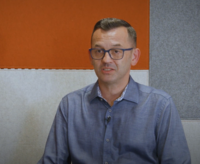How I got my job at the BBC
Watch Alex, Ella, and Levi talk about their journey to becoming a journalist.
Considering going into journalism? We speak to Levi, Alex, and Ella who all took different routes to get into the same career.
Whether it's apprenticeships, university, or something else, there are different ways you can start working in your chosen field.
Levi, Alex, and Ella’s stories show you how they secured their careers, all following different paths including university, apprenticeships, and a school leaver scheme. Plus, we get expert advice from Daniell in early careers at the BBC.
Levi: I’ve always been a talkative person and I was always that person that got in trouble for talking too much at school. So, when it came to work experience, I started at a local radio station called Represent just helping the presenters. I did research for the shows, and they would let me practice on the mics which is when I thought, this is what I want to do.
Alex: I did a degree in history and politics and a master’s degree after that. I was eight years old when I got a hunger for journalism. Michael Owen had just scored his first goal against Argentina, and we had to write an article about it at school. I was young obviously, but it was quite good fun choosing the headlines and stuffs. I thought, I can't walk but I can write.
Ella: When I finished sixth form a lot of my friends went to uni, and I didn't want to do that. For a few years I worked in my hometown of Bristol, and I moved into a house with loads of journalists doing their NCTJ qualification. One of them was doing the BBC apprenticeship and I thought that looks much more interesting than what I'm doing. Then I started thinking quite seriously about applying for the scheme.
Watch Alex, Ella, and Levi talk about their journey to becoming a journalist.

There are so many different routes into journalism. There's the more traditional route, which is through a degree in journalism or a post-grad in journalism. But nowadays of course there's also apprenticeships, whether its school leavers, people coming new into journalism and there’s also degree level apprenticeships.
Levi: There was a careers adviser in my school, and he opened me up to the idea of apprenticeships. So, I sat down with him, and we just started looking for apprenticeships together. Then the BBC one came up.
Alex: All my friends on my master’s course had got into journalism schemes elsewhere and I hadn't yet. So, I looked at where I could have an impact, be heard, and get my articles and ideas out there best. So, I thought, let's start with the biggest organisation and that's here at the BBC.
Ella: I considered a master’s degree but they’re expensive and I don't have an undergraduate degree. So, I thought I could never work in a newsroom. I sent an email enquiring about whether I’d be eligible to do the scheme without a degree, because it said equivalent experience was accepted and they said yes so, I applied.
Levi: I was with my friends at the pub when I got the call saying I’d been successful and they wanted to offer me the job. I ran to my mum's house and told her, and I felt so relieved and happy. I took a risk, and it paid off.
Alex: My mum and dad were on holiday, and I emailed them and told them I had some news. They thought it was really bad news and then they called up and told them I got the job.
Ella: It sounds really cringey but when I got the call to say I’d got the job, I knew it was going to change my life and it has.

We’re looking for individuality and for people to be their real authentic selves. And this is something I always say at assessment centres and interviews, we want to see their personality.
Levi: My advice for someone else who might be struggling with that decision or might think that they have to go to uni to get into somewhere like the BBC, I would say take the risk. I took the risk and it paid off even
Alex: My best advice is to believe in what you want to do and that’s the key. Because you will always get pushed back, but you have to keep going.
Ella: My advice is there are plenty of journalism schemes out there, especially within media and, ever more so now. Even since I've gotten into into journalism, I've seen new schemes which have popped up and I think that would have been great for me.

What I would say to someone who isn't quite sure what the right pathway for them is that's fine. You don't need to know the pathway just yet. The best thing to do is just to develop your experience, try things out. If you can get work experience, if you can apply for schemes, if you can try shadowing somewhere, any sort of opportunity to just find out a bit more is going to help you get there.